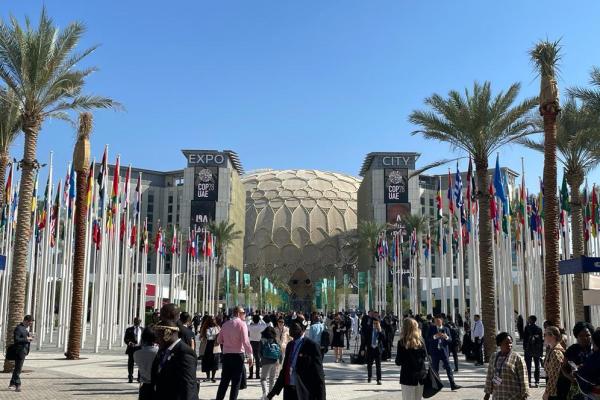Just before the onset of the monsoon season in the India subcontinent, we partnered with our Associate member Mumbai First to deliver the Global Coastal Cities Summit in Mumbai, India. Organised under the umbrella of India’s 2023 Presidency of the G20, this international event was a global conversation on climate solutions for coastal cities, including futureproofing, sustainable flood mitigation and the cross-financing of climate mitigation and adaptation.
Engineering Leadership Group Executive Roundtable
During the Summit, we also held our second convening of the Engineering Leadership Group (ELG) following the previous Executive Roundtable at MIPIM 2023 in Cannes, France in March this year. In the meantime, we published the ELG Manifesto, which conveys the vision of the ELG and outlines the role of engineering-inclusive organisations in the development of the equitable, sustainable, and resilient infrastructure that our society and planet need. The Mumbai ELG Executive Roundtable was the initiation of our engagement with the G20. It brought together the world’s leading engineering-inclusive organisations and focused on the role of urban infrastructures in the transition to a net-zero economy. Key discussion points from this Executive Roundtable are being officially submitted to the G20 India Presidency as part of the Summit Proceedings.
At this Executive Roundtable, we called on G20 governments to work with private-sector and engineering-inclusive organisations to introduce policies to support the parallel development of multiple low-carbon technologies to improve the availability of financially feasible decarbonisation pathways, with a view to driving sustainable economic growth.
An unprecedented transformation of how we think about infrastructure is needed to achieve the world's climate and development objectives. The transition to a net-zero economy requires a global transformation of the world’s energy system from one based on molecules (from fossil fuels) to one powered by electrons (from renewable energies). Annual capital investment needs to triple to generate the infrastructure needed for decarbonization of key industries in line with the 2050 net zero target. That ambition brings with it a range of issues around the mobilisation of that capital, including the human resources that will be required to put that capital to effect and the establishment of the necessary supply chains to enable that scale of development.
The required investment will likely exceed public funding capacity, opening the door for private capital. Hence the need for solutions with positive net present value. However, about half the investments required to meet emission targets still do not have positive stand-alone investment cases, and the blockage seems to be at the pre-Final Investment Decision (FID) stage. Hence the dire need to de-risk projects at this stage to bring in the private investment capital that is going to be required. Governments have a key role to play here, by providing policy certainty and policy incentives.
Engineering-inclusive organisations are best positioned to inform policy development and explore innovative business models for renewables and energy decarbonisation. Engineers are the linchpin that connects policy to implementation; it is what they are trained to do. The unprecedented challenges facing today’s infrastructure require engineers to work beyond traditional silos and be inclusive of all other disciplines that can be co-drivers of policy development.
Strategies for Protecting City Infrastructure by Partnering for Resilience & Sustainability
Together with Mumbai First, Resilience Rising, Arup, Lloyds Register Foundation, Lloyds Register Group and UNFCCC’s High-Level Climate Champions, we delivered a session on urban coastal infrastructure protection. The session highlighted the criticality of infrastructure in coastal cities, with a particular focus on how major ports can be safeguarded from the disastrous impacts of climate change. It also delved into building capability and resilience within existing infrastructure, taking inspiration from the successful practices implemented by our partners locally and globally.
We were first introduced to Resilience4Ports, the first Innovation Lab launched by Resilience Rising to mobilise a critical mass to create the scale and momentum necessary to break through this industry’s barriers to resilience. The program supports unlocking of the comprehensive set of 2030 Breakthroughs for the Maritime sector announced by the UN High Level Climate Champions together with the adoption of the Sharm El Sheikh Adaptation Agenda at COP27. Resilience4Ports will improve the resilience practice across the ports value chain by bringing together stakeholders and a community of practitioners around a common framework to raise awareness and strengthen relationships, create a shared understanding of the needs and challenges, and clarify and connect decision-making and investment that can be taken to scale.
We then heard about the unique challenges faced by riverine port operations and discussed the role of comprehensive emergency planning (including all hazards, all stakeholders, all phases and all impacts) in port resilience. This can include activities such as mitigating hazards through land use planning, but also retrofitting and rebuilding existing buildings and infrastructure.
Lastly, we learned from best practices used in ports worldwide. One example is the asset valuation approach, which considers market value based on discounted future cash flows and incorporates scenario analysis for risk metrics with a view to avoiding stranded assets. Another example involves the use of management simulations and serious games as a metaphor for policy and planning, including the encouragement of public private partnerships to accelerate resilient communities.



